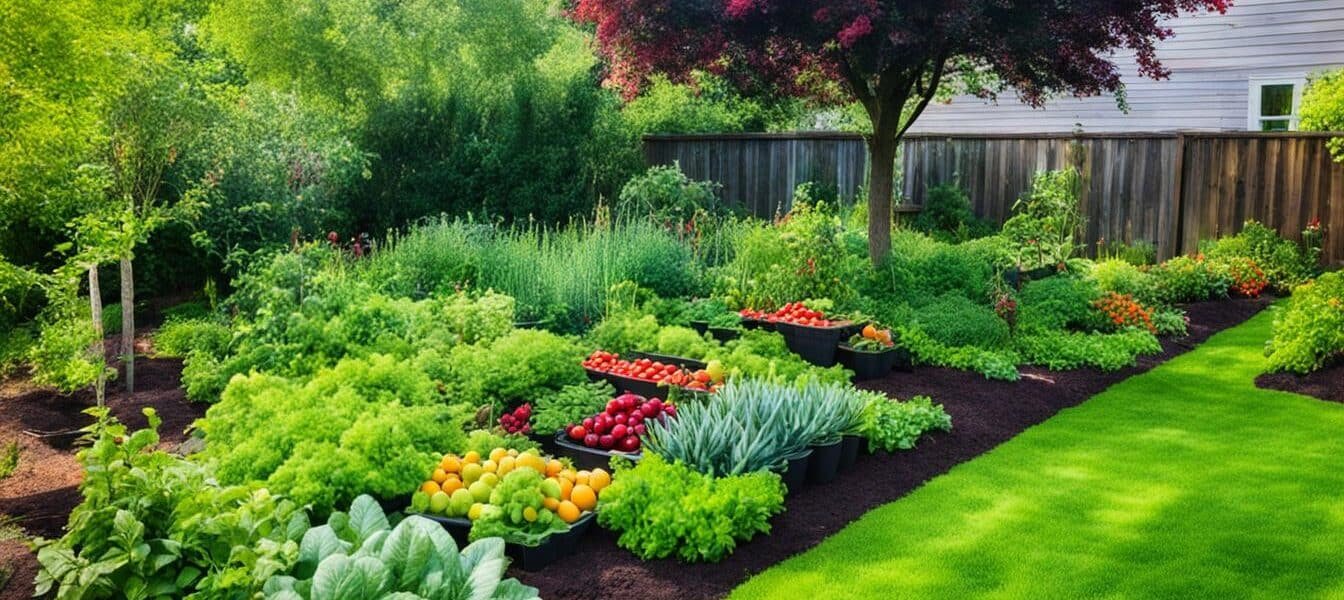Organic Fruit Gardening: Growing Healthy, Pesticide-free Fruits
People who want to grow fruit without using pesticides can succeed with organic gardening. It involves using natural techniques and avoiding chemicals. This way, you can grow plenty of tasty and healthy fruits, from apples to berries. Organic gardening gives you many options for growing at home.
Yet, knowing about organic gardening is crucial. Just because something is organic doesn’t mean it’s completely free of pesticides. Pesticides from natural sources are still pesticides and can be used on organic crops. The difference is how these pesticides are made, not their pest-fighting power.
Going organic brings many good things. For one, you get to enjoy produce that’s full of nutrients and tastes great. It also means you’re not adding harmful chemicals to the earth. By learning about organic pesticides, you can wisely steer your fruit garden toward success without using synthetic chemicals.
Key Takeaways : Organic Fruit Gardening
- Organic gardening does not mean produce is entirely free of pesticides, as organic pesticides are still considered pesticides under the law.
- Organic fruit gardening offers benefits such as nutrient-rich, flavorful produce, environmentally sustainable practices, and reduced exposure to synthetic chemicals.
- Proper planning, soil preparation, and natural pest and disease management are crucial for successful organic fruit gardening.
- Choosing the right fruit varieties for your climate and designing an efficient garden layout can maximize productivity and minimize maintenance.
- Composting, mulching, and other organic soil management techniques are essential for building a healthy, nutrient-rich foundation for your fruit plants.
Demystifying the Organic Pesticide Myth
Many people think that if something is organic, it must not have pesticides. But, this isn’t true. The word “organic” doesn’t always mean “pesticide-free.” Both organic and non-organic produce can have pesticide residues.
What Defines a Pesticide?
A pesticide is a substance that gets rid of pests. It can be for insects, weeds, or fungus. Even if it comes from nature, it’s still a pesticide by law.
Organic Pesticides: Still Pesticides
Don’t be fooled into thinking organic fruits and veggies are free from pesticides. Growers use organic pesticides to protect their crops. Sometimes, these organic ones can actually be worse than synthetic ones. This means both types of produce can have some pesticides on them when you get them from the store.
Understanding this is key for gardeners. Using organic pesticides is nice for the environment, but it doesn’t guarantee a lack of residues on the fruits and vegetables. A balanced approach to managing pests and diseases is important. It helps make the produce healthy and full of nutrients in your organic garden.
Benefits of Organic Fruit Gardening

Organic fruit gardening is packed with perks for everyone. It uses natural methods which bring many good things. This includes not using synthetic chemicals like pesticides and fertilizers.
Nutrient-Rich, Flavorful Produce
Organic fruits and vegetables are known for being nutrition-packed. They have more vitamins, minerals, and antioxidants than those grown conventionally. This makes them not just healthy but also tastier.
Techniques like composting and using organic matter enrich the soil. This gives plants all they need to grow well. So, you get a lot of bountiful, scrumptious produce each year.
Environmentally Sustainable Practices
Gardening organically helps more than your own home garden. It’s good for the planet too. Organic methods keep the soil and environment healthy. Unlike using synthetic pesticides and fertilizers, they don’t harm the good bugs or the water. This makes gardening sustainable and eco-friendly.
Reduced Exposure to Synthetic Chemicals
Selecting organic fruits and vegetables means less synthetic chemicals touch your family. This matters a lot for families with kids. Kids are more at risk from these bad chemicals. Choosing organic, pesticide-free items protects your family. It leads to a safer and more sustainable life.
Planning Your Organic Fruit Garden
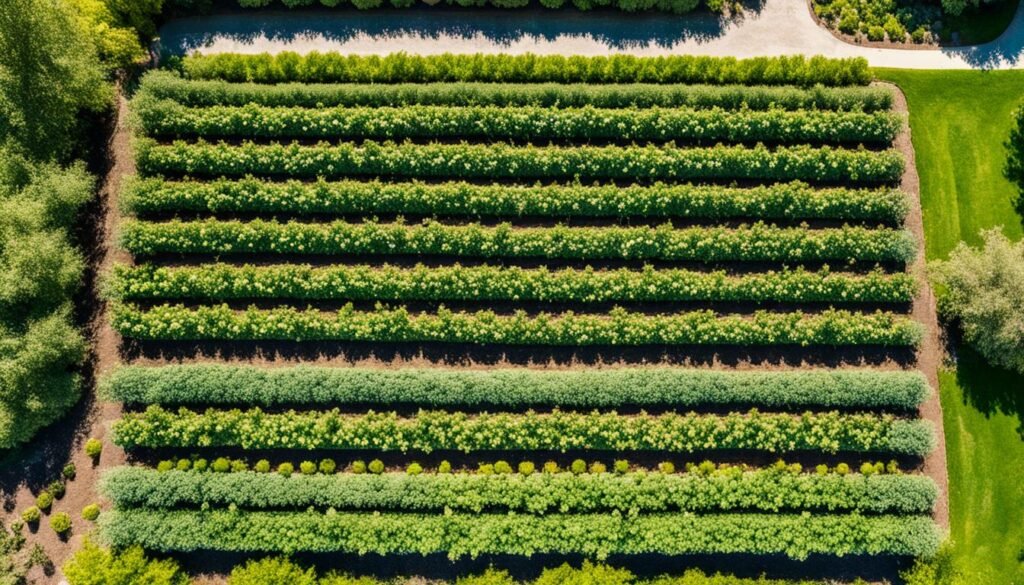
Starting an organic fruit garden needs planning to grow well and give lots of fruits. Begin by picking the fruits for your local climate. Every kind of fruit needs different levels of light, heat, and water. Choose ones that fit best with your area. This will help your garden do well with less work.
Choosing the Right Fruits for Your Climate
Think about what each fruit you want needs before planting. For instance, strawberries like it cool and sunny, while grapes need lots of sun and warmth. Knowing the needs of each fruit tree or berry bush helps them grow strong. They’ll get the right amount of water, food, and attention.
Designing a Garden Layout
How you set up your organic fruit garden matters for how much it grows. You can plant things that help each other, which keeps pests away. Just like companion planting. Also, growing up instead of out, like on walls or in hanging pots, saves space. This way, you can enjoy a garden that’s not too much work.
Organic Soil Preparation and Maintenance
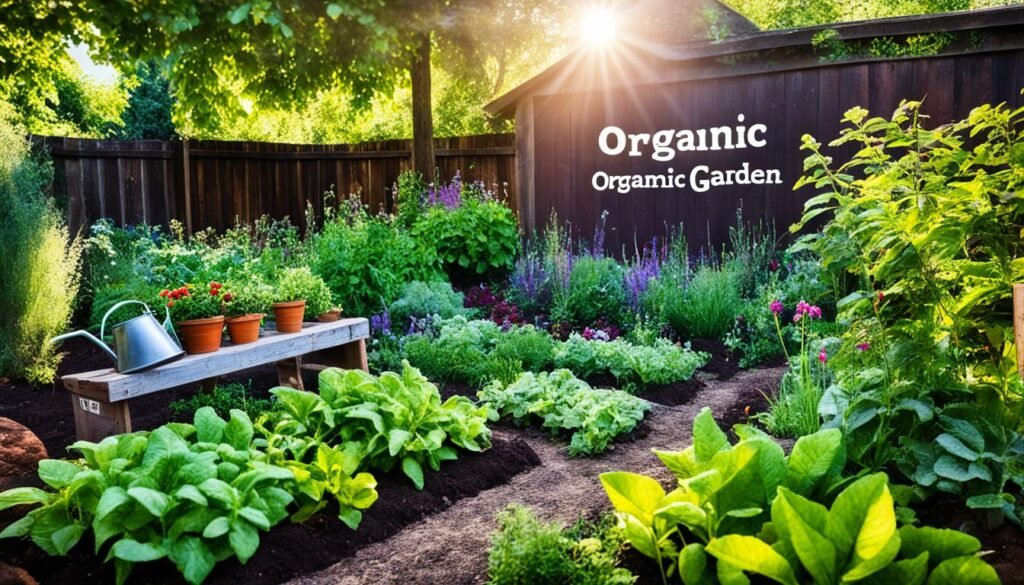
Creating a flourishing, organic garden begins with a strong, nutrient-filled base for your fruit trees and plants. Composting is key, helping to produce outstanding garden soil.
Composting for Nutrient-Rich Soil
Composting turns scraps like leaves, veggie scraps, and grass clippings into useful soil mix. Through this natural breakdown, it gives off nutrients for plants to feed on. This boosts their growth and the amount of fruit they produce. Adding compost to garden beds not only feeds the soil but also helps microbes that protect your plants from pests.
Mulching to Retain Moisture
Keeping soil moist is vital for an organic fruit garden. Placing organic mulch like wood chips or straw around your fruit trees keeps moisture in and weeds out. The mulch also improves the soil’s quality as it breaks down. This creates a natural and easy care space for your homegrown fruits.
Organic Pest and Disease Management
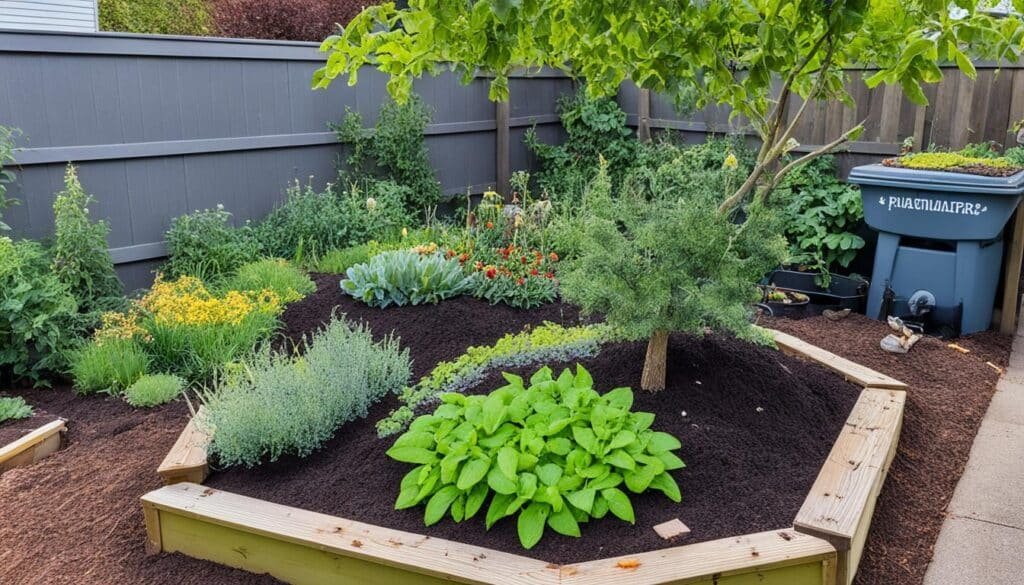
Maintaining the health of an organic garden is key. It involves managing pests and diseases with a well-rounded strategy. Companion planting is a powerful method. It involves growing certain plants together to create a natural balance. This pairing helps deter pests naturally and invites good insects.
Companion Planting
Take marigolds and tomatoes for instance. Planting them side by side can keep nematodes away. In another example, basil and asparagus work well together. Basil keeps away aphids, and the asparagus acts as a barrier to pests. Through smart plant arrangement, we can make a space that’s not friendly to plant pests.
Organic Pesticides and Fungicides
Sometimes, crops may need extra help against pests and diseases. This is when organic pesticides and fungicides come in. They’re made from natural ingredients like neem oil, Bacillus thuringiensis, and copper. They can be used specifically to treat affected plants without harming the garden’s overall health.
Organic Fruit Gardening: Growing Healthy, Pesticide-free Fruits
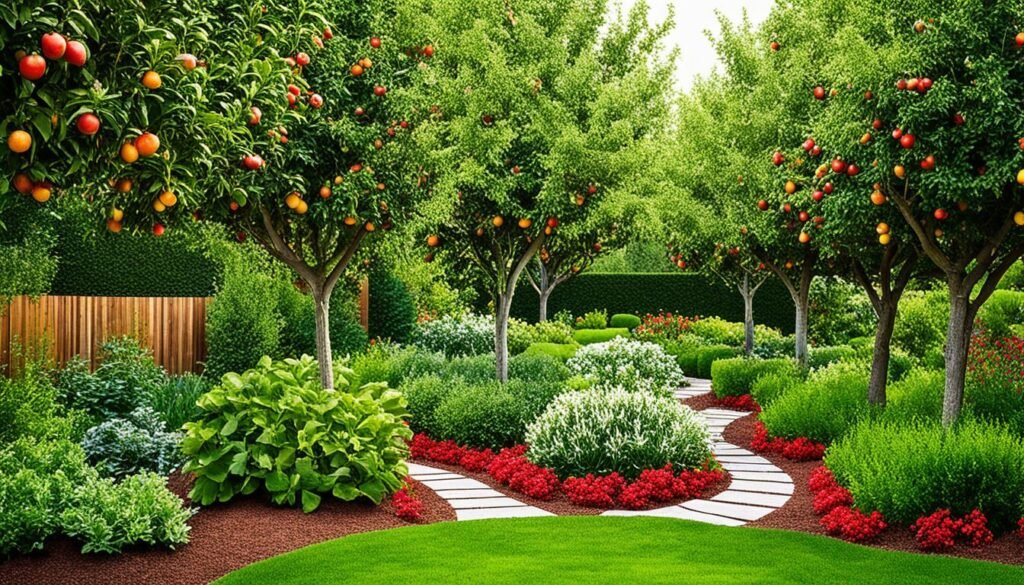
This part is a quick review, showing how to grow pesticide-free fruits. Organic fruit gardening has many good points. It produces nutrient-rich, flavorful produce, it’s kind to the earth, and limits chemical contact. Knowing the truth about organic pesticides, designing the garden, making the soil good, and using eco-friendly pest controls are key. These steps help in making a rich, pesticide-free fruit garden.
Pruning and Training Fruit Trees
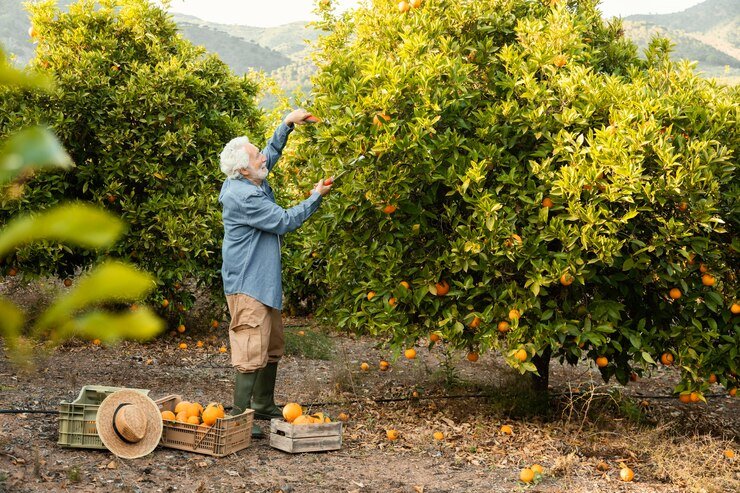
Pruning and training are key for keeping fruit trees healthy and productive. Pruning helps the tree keep its shape and produce better fruit. It also controls the tree’s size and shape. Training trees with methods like trellising saves space and makes picking fruit easier.
Using these techniques, fruit trees in an organic garden can do very well. They will yield lots of great fruit every year. Your organic garden will look beautiful and be full of delicious fruit. It’s something the whole family can enjoy.
Harvesting an
The growing season means your hard work in an organic fruit garden is about to pay off. Watch your plants closely as they ripen, making sure to pick or cut the fruits at their best. Be gentle, so you don’t damage them.
Some organic fruits are perfect to eat right away like raspberries and strawberries. For fruits like apples and peaches, a little waiting can make nutritious them even better. After harvesting , store your fruits in a cool, dry spot. You can also can, freeze, or dry them for later.
Eating what you’ve grown without pesticides is special. It’s about more than just tasty food. It connects you with the earth, helps the planet, and supports a sustainable food future. So, when harvest time comes, enjoying a fresh peach or raspberry is truly rewarding.
FAQs
Q: What is organic fruit gardening?
A: Organic fruit gardening involves growing fruits without the use of synthetic pesticides or chemicals, focusing on natural methods to nurture and protect plants.
Q: How do I start growing organic fruits in my garden?
A: To start growing organic fruits, choose a sunny location with well-drained soil, select fruit varieties that thrive in your climate, and use natural fertilizers and pest control methods.
Q: What are some popular organic fruits that are easy to grow?
A: Some popular organic fruits that are easy to grow include strawberries, melons, blueberries, and raspberries, which are known for their productivity and flavor.
Q: What are the benefits of growing perennial fruits organically?
A: Growing perennial fruits organically ensures a sustainable source of fruit year after year, without the need for replanting or harmful chemicals that can impact the environment.
Q: How can I improve the soil composition and pH for growing organic fruits?
A: You can improve soil composition and pH for growing organic fruits by adding organic matter, such as compost or mulch, to enhance fertility and balance the pH levels to support healthy fruit growth.
Q: What are some tips for growing fruit trees organically?
A: When growing fruit trees organically, it’s important to prune regularly, provide adequate water and nutrients, and protect against common pests and diseases using natural remedies and beneficial insects.
Q: Can I grow organic fruits in containers or small spaces?
A: Yes, you can grow organic fruits in containers or small spaces by choosing compact fruit varieties, providing proper care and maintenance, and maximizing sunlight and water for optimal growth.
Source Links
- https://www.johnson.k-state.edu/lawn-garden/agent-articles/environment/organic-does-not-mean-pesticide-free.html
- https://www.quora.com/What-are-the-benefits-of-using-organic-ingredients-in-a-fruit-vegetable-garden-What-can-happen-if-non-organic-produce-is-used-in-such-gardens
- https://pubs.extension.wsu.edu/organic-pest-management-in-backyard-fruit-trees-and-berry-patches
